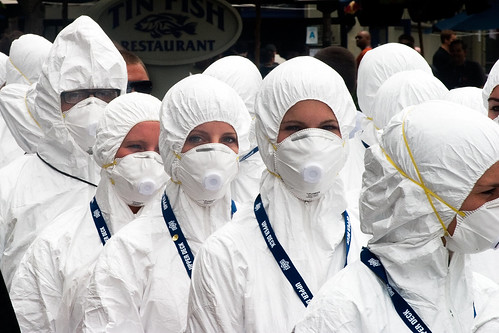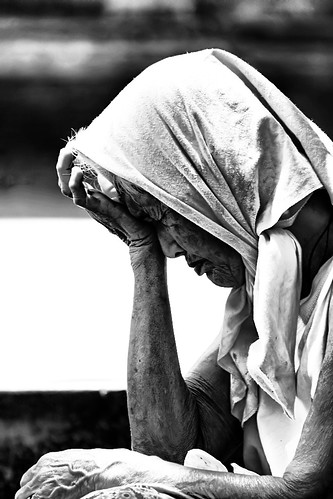
6th Sunday in Ordinary Time (B)
From Quarantine to Compassion
Readings: Leviticus 13:1-2, 44-46; Psalm 32: :1-2, 3-4, 5-6; 1 Corinthians 10: 31-11:1; Mark 1:40-45
Picture: CC scragz
Sisters and brothers, there’s a bug going around town, isn’t there? In my community, three out of the five of us have been feeling under the weather. And wherever I go, whether it’s in school or church, at the café or on the street, I seem to encounter more people with coughs and sniffles, at least more than usual. I’ve also noticed my own reaction to all this. I’ve noticed myself becoming more conscious about personal hygiene, more careful about whom I sit next to or shake hands with. I even find myself getting mildly irritated when people forget to cover their mouths and noses when they cough or sneeze. Still, in spite of my irritation, I try not to make too big a deal of it. Even if I do move away just a little when people cough, I try to do it discreetly, without seeming impolite.
But I imagine that my apparent patience is only because the illness is relatively minor. As much as a bad cold will inconvenience me, I know that I’ll probably recover in a couple of weeks. What would my reaction be if the illness were more serious, more highly contagious? What if it was SARs, or a particularly resistant strain of TB, for example? Would I be satisfied with simply practicing good hygiene? Probably not. Faced with such dangers, we tend to step up our precautions, don’t we? We move from hygiene to quarantine. We isolate the sick in order to protect the healthy. We set up boundaries between places that are sterile and those that are infected. We try to shield ourselves by remaining inside and avoiding the outside.
And it’s not just against physical illness that we do this. Don’t we find a somewhat similar move from hygiene to quarantine in international relations? Don’t we boycott or embargo so-called rogue states or dictatorships? And how about when we send crazy people to asylums, and criminals to prison? Or when the poor end up on the streets? And, closer to home, don’t many if not all families have so-called black sheep -- those we prefer to avoid meeting or talking about?
Which is why the practice we find in today’s readings is not so difficult to understand. In the first reading, someone with a sore on the skin is considered a threat to the community, not just medically, but also spiritually, since that person is considered ritually unclean, and needs to be quarantined. Notice the clear demarcation, in the first reading, between the inside and the outside of the camp, and in the gospel, between the town and the deserted places. If the healthy are to be protected, the sick need to be isolated.
As prudent and highly necessary as this practice is, however, it does have dangers of its own, doesn’t it? For one thing, when we isolate those we deem to be sick in one form or another, don’t we run the risk of forgetting about them altogether, of treating them as if they were nonexistent, even of wishing they were dead? Much like one would remove a diseased limb from one’s body, in dealing in this way with those we deem to be diseased, don’t we run the risk of moving beyond quarantine to the more drastic step of amputation?
And this tendency to amputate is something we need to pay close attention to. It is a sign that we are fooling ourselves if we think that we can keep ourselves truly healthy simply by practicing hygiene and quarantine. For this tendency is a symptom of a more deadly disease that infects us all, whether we find ourselves inside or outside. This particular sickness makes our fear and our need for self-preservation run riot, to the extent that we are even willing to sacrifice others to save ourselves. Aren’t the Holocaust and other instances of genocide only among the more extreme examples of the deadly effects of this illness?
Thankfully, however, for some mysterious reason, we never quite succeed in our attempts at doing away with the different and the diseased, the infirm and the inconvenient. Somehow, those we seek to amputate have a way of coming back to haunt us. Isn’t this what we find in today’s gospel, when the leper suddenly shows up where he isn’t supposed to be? Kneeling down, he begs Jesus: If you wish, you can make me clean.
The leper’s actions and his words offer us both a diagnosis and a cure for our disease. If you wish, you can make me clean. Doesn’t this simple straightforward statement powerfully uncover our illness? Isn’t the trouble with us not so much that we can’t make him clean, but that we don’t really want to? And if we really allowed the sight of that wretched specimen of humanity, kneeling in the dusty street, to move our hearts and to haunt our memories, as Jesus so plainly does, will we not also begin to be healed of our own deadly disease, our selfishness and our apathy?
Quite ironically, it is in the leper – in those we may prefer to forget and to isolate, to quarantine and to amputate – that we find the possibility for salvation. But this possibility of a cure only becomes a reality for us if we do what Paul advises in the second reading. We are saved only if we imitate the Lord in seeking the benefit of many, in allowing our fear to be changed into compassion, our passivity into action. And it is precisely this change, this great healing, that Jesus seeks to bring about.
Perhaps this also explains why Jesus insists that the leper should not publicize his cure. For once we think that he has been healed of his disease, can the leper still provide us with a cure for our own? Will he still be capable of moving us to compassion? And perhaps this is also why Jesus ends up exchanging places with the one who can’t keep a secret. In remaining outside in deserted places, Jesus takes on the role of the leper, and becomes the cure for our disease. In order to find Jesus and the healing that he brings, we need to leave the deceptive protection, the artificial isolation, of our towns and our camps. We need to reach out to those living on the fringes, those we might otherwise prefer to ignore and to forget. And, especially with the economy the way it is, it is probably not too difficult for us to find such people today.
Earlier, in our opening prayer, we said that in Jesus Christ God changed humanity’s history by his command of perfect love. Through his life, death and resurrection, Jesus shows us an alternative to our fear-driven strategies of hygiene, quarantine and amputation. He offers us the possibility of writing a different history, a history driven by love and compassion, a history of healing and reconciliation, a history characterized by a reaching out in love to those most in need.
Sisters and brothers, even as many are celebrating St. Valentine this weekend, perhaps it’s appropriate for us to ask ourselves which history it is that we are writing, which disease it is we are resisting today?

